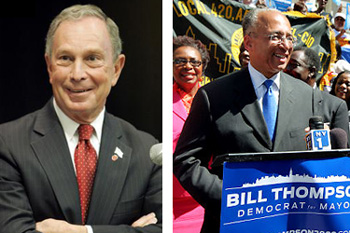A camera lens analogy might help voters understand where Michael Bloomberg and William Thompson, who are New York’s main mayoral candidates, stand on key real estate issues ahead of tomorrow’s election.
Bloomberg, the Republican incumbent, seems to favor a wide-angle approach, as his sweeping rezoning of a fifth of the city, or 8,400 blocks over eight years in office, would indicate.
Focused on creating denser, more transit-oriented development, according to his PlaNYC, which was unveiled in 2007, the city has famously paved the way for homes to be built into once-industrial swaths of land, notably along the Williamsburg waterfront in Brooklyn.
Similarly broad-minded is Bloomberg’s current vow to create or preserve 165,000 affordable units by 2014, though that target date had been 2013 until just a few weeks ago.
His campaign Web site does not talk about companies that rezoning displaced, though it does promote a new streamlined licensing processes for existing small businesses, as well as plans for a “Main Street Center,” which, with a $500,000 infusion from the city, could revitalize ailing commercial districts.
“Mike Bloomberg believes that New York City’s 200,000 small businesses form the backbone of the city’s private sector,” his site states. A campaign spokesperson declined repeated requests for an interview.
Meanwhile, his chief opponent, Thompson, the city’s Democratic comptroller, prefers a zoomed-in perspective. He argues that affordable housing goals should be set on a neighborhood basis, and in lockstep, rent laws should be moved from state control into city hands.
Similarly, Thompson supports repealing the rent regulation law that lets landlords charge market-based rents once they climb above $2,000.
It may explain Thompson’s support for the recent court decision that the owners of Stuyvesant Town and Peter Cooper Village improperly overcharged tenants in the complex, since the landlords were receiving tax breaks.
“This is a great day, a great victory,” Thompson said afterward, according to reports.
For his part, Bloomberg also backed the decision, though less enthusiastically.
“Today’s decision provides some degree of clarity on an issue that has been debated for a long time,” he said in a statement following the court ruling, “although the scope of its impact will take more time to know.”
Similarly, commercially speaking, Bloomberg’s rezoning policies have hurt New York block-for-block, Thompson said, particularly with small businesses, as many of the manufacturing zones they might have set up in are gone.
Thompson will place “a moratorium on the proposed rezoning of an additional 1,800 acres in manufacturing zones,” he said in an October speech to the Staten Island Chamber of Commerce, in which he singled out Manhattan’s Garment District. A campaign spokesperson declined repeated requests for an interview.

In the Garment District, Thompson seeks to preserve one million square feet of space by helping not-for-profits buy buildings, renovate them and lease them to start-up fashion companies.
“The Bloomberg administration’s top-down approach to economic development has disproportionately relied on ill-conceived mega-projects and re-zonings that produced wealth for developers but few living-wage jobs,” he said in the Staten Island speech.
On the one hand, the city’s housing downturn and general real estate collapse have created a point of inflection for Thompson, who can now talk about how many of Bloomberg’s plans were misguided: Tall condominiums in Williamsburg sit largely unsold and landscape-altering projects like City Point in downtown Brooklyn are stalled, though others, like the revitalization of downtown Jamaica, Queens, have met success.
On the other hand, now that the development boom has cooled, fewer residents may be in immediate danger of displacement, which can undermine Thompson’s claim that major policy changes are needed, said John Mollenkopf, a political science professor at the City University of New York.
Though their victory is not widely considered likely, there are seven other candidates running for the mayor’s post, including Jimmy McMillan, whose Rent is Too High party (the election board changed the party’s name from “Rent is Too Damn High” on the ballot because it was, allegedly, too verbose to fit), is intended to have resonance with the real-estate-minded electorate.
McMillan, who’s spent $149.19 on his campaign, for automobile gas, claims rents will fall if he wins because he will expose a discrimination-based “conspiracy” among lawmakers, the city’s buildings department, Fannie Mae and developers, among others.
“There are so many people involved in this scheme, I can’t wait to drop the bombshell,” said McMillan, adding that his one-bedroom in Flatbush is reasonably priced but his son’s, in the East Village, is “through the roof.”
But for their part, brokers are paying limited attention to a race, even as it smashes fundraising records: By Oct. 23, Bloomberg had spent $85.2 million, with $100 million projected by tomorrow. Thompson, meanwhile, has $8 million on-hand and had spent about $5 million by early October.
But some issues are striking a chord.
Raphael De Niro, a managing director at Prudential Douglas Elliman, for one, is concerned about a proposal to build a large trash facility at Spring and Washington streets in Soho. Bloomberg supports it, while Thompson does not.
Other brokers are worried about possible tax increases as the city grapples with deficits, whether they are real estate transfer tax hikes, or for property and income taxes, according to Deanna Kory, a senior vice president at the Corcoran Group.
“We need to keep them reasonably in line, to make sure that the city is an attractive place to live,” Kory said.
Neither candidate has been definitive about their tax plans. But Bloomberg has said he opposes a “millionaire’s tax,” which is a State Assembly proposal to slap a three-quarters of a percent tax on people who make more than $1 million, to fund public transit. Thompson, meanwhile, says he’s open to it.
But with polls showing Bloomberg enjoying a comfortable double-digit lead heading into tomorrow’s match-up, most brokers are focused elsewhere.
“It’s always been so predetermined that Bloomberg would win,” said Lisa Lippman, a senior vice president with Brown Harris Stevens. “People are more concerned that Wall Street recovers.”
